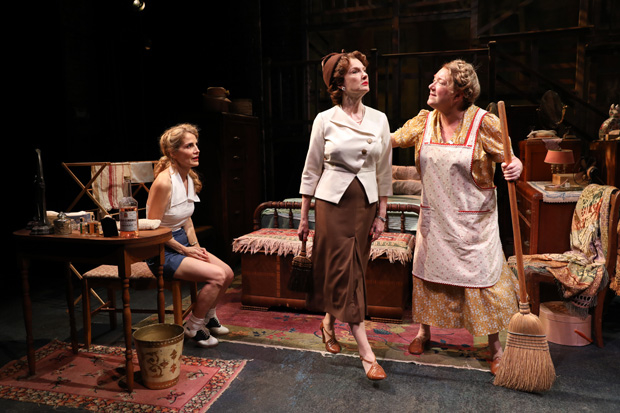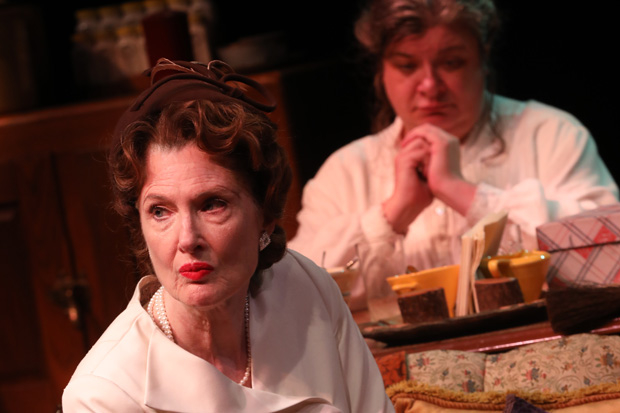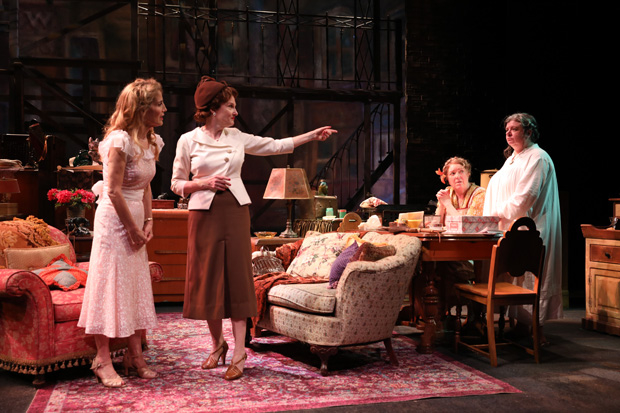Heartbreak Tennessee Williams-Style in A Lovely Sunday for Creve Coeur
La Femme Theatre Productions revives a rarely seen late work by the Pulitzer-winning playwright behind ”A Streetcar Named Desire”.

(© Joan Marcus)
The women in Tennessee Williams's A Lovely Sunday for Creve Coeur (now receiving a rare revival with La Femme Theatre Productions) are engaged in a reverse game of musical chairs: No one wants to be left sitting alone at the end. Such desperation to escape solitude is a recurring theme for the playwright behind The Glass Menagerie and A Streetcar Named Desire.
Unlike those very famous plays, A Lovely Sunday for Creve Coeur hasn't received a major production in New York since its 1979 premiere. This stellar revival by director Austin Pendleton makes us seriously wonder why. Creve Coeur is the name of a park in St. Louis, but it is also French for heartbreak, and there's plenty of that to go around in this underrated gem.

(© Joan Marcus)
It takes place in 1937. Schoolteacher Dorothea (Jean Lichty) and secretary Bodey (Kristine Nielsen) are two single gals sharing an apartment in Williams's hometown of St. Louis. Dorothea (who originally hails from the Deep South) does her exercises while awaiting a phone call from Ralph Ellis, the school principal with whom she has recently been on a date. Bodey prepares for a picnic at Creve Coeur, where she hopes Dorothea will take a romantic interest in her twin brother, Buddy. The arrival of Dorothea's colleague, Helena (Annette O'Toole), further complicates matters: She's come to collect a deposit on an apartment in a more fashionable part of town. Dorothea has promised to leave Bodey and move in with her. Of course, Dorothea would gladly ditch both of these women to become Mrs. Ralph Ellis.
Sparks fly as the steely Helena grates against the flinty Bodey. The descent of upstairs neighbor Miss Gluck (a scene-stealing Polly McKie portraying a depressive Valkyrie) adds further chaos to the mix, with differences of class and temperament fueling this combustible comedy. Williams fills the script with some real howlers, like "loneliness in the company of five intellectually destitute spinsters is simply loneliness multiplied by five" and "please remove the fried chicken from the society page." All four women are delightfully over-the-top. Detractors might describe this as cruel misogyny borne out of the fevered imagination of an old queen, but honestly, some people really are as ridiculous as Williams writes them.

(© Joan Marcus)
Luckily, Pendleton understands that great comedy is always grounded in real stakes and truthful performances. Executing knee-bends for dear life, Lichty is every bit the Williams Southern belle, collapsing onto her bed as she screams for pills and sherry. Her one misstep is a tendency to whisper her lines, which seems appropriate for two girlfriends sharing secrets in a tiny apartment, but is death in a space as acoustically treacherous as Theatre at St. Clement's. Projecting with bullhorn clarity, Nielsen suffers from no such problem. While her Bodey is aggressive in her meddling best friend routine, her reasons behind it are completely sincere and her vulnerability feels genuine. Nielsen once again delivers a performance that reaffirms her status as one of New York's greatest comedians. O'Toole matches her toe-to-toe as the ludicrously snooty as Helena, raising her arm like a Roman statue when she mentions the subject she teaches (art history). Her angular performance fits neatly within the chic asymmetry of her outfit (smart period costumes by Beth Goldenberg, who really understands the aspirations of each of these characters).
Harry Feiner's overstuffed set easily conveys just how stiflingly cozy the apartment is, with shoved-together furniture serving as a makeshift wall dividing the bedroom from the living room. Upstage is dominated by a tenement tangle of fire escapes and stairs, leading us to suspect that The Glass Menagerie's Amanda Wingfield lives just downstairs.

(© Joan Marcus)
Ignoring the intermission in the script, Pendleton wisely presents Creve Coeur in 105 uninterrupted minutes, revealing the play to be one brilliantly constructed and completely continuous scene. The comedy and drama build in equal measure, often feeding off each other. All of that springs from the truth at the heart of Williams's writing. Creve Coeur may be set in St. Louis 81 years ago, but any single person currently living in New York knows that when it comes to finding a place to live, the border between comedy and tragedy is porous and ever-changing.








